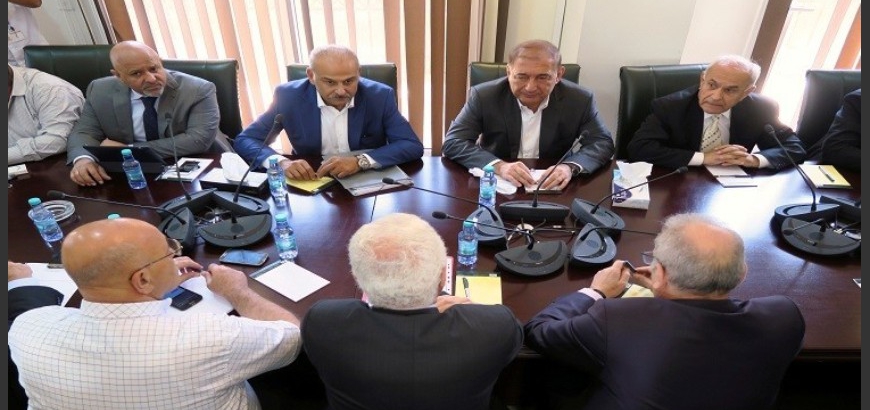The Syrian opposition is preparing for the Riyadh II talks, set to begin on Nov. 22 in the Saudi capital, as challenges face the conference following the failure of its first round to achieve its primary aim of forming a “united delegation” of the Syrian opposition.
The opposition formed a preparatory committee for the conference, which included people from the Syrian National Coalition, the National Coordination Committee and the bloc of independents, as well as the Moscow and Cairo platforms and rebel groups.
The Saudi newspaper Okaz reported on Sunday that representatives will include Badr Jamous of the Coalition and Ahmed al-Asrawi of the Coordination Committee, along with Marah Bukai of the independents’ bloc, Alaa Arafat of the Moscow platform and Qassim al-Khatib of the Cairo platform. Meanwhile, the rebel groups will be represented by the head of the Jaish al-Islam (Army of Islam) political bureau, Mohamad Alloush.
The Coalition will participate in the second Riyadh conference with 24 representatives, at their head two previous Coalition presidents, Hadi al-Bahra and Anas al-Abdah, and the previous secretary-general, Abdullah Fahed.
The political authority in the Syrian National Coalition approved a list of names that will participate in the broad Riyadh meeting of opposition figures, while informed sources in the opposition revealed that the Kurdish Democratic Union Party (PYD) has not been invited.
Coalition member Ahmed Ramadan said that the names of those participating from the Coalition in the conference were: Riad Seif, Abdelrahman Mustafa, Abdelbasat Hamou, Nazir Hakim, Nasser al-Hariri, Hadi al-Bahra, Anas al-Abdah, Badr Jamous, Abdelahad Astifo, Ahmed Sayed Youssef, Ahmed Ramadan, Hawas Khalil, Fouad Aliko, Ruba Haboush, Basma Mohamed, Mohamed al-Shimali, Abdillah Fahed, Riad al-Hasan, George Sabra, Aqab Yahya, Mohamed Yahya Maktabi, Jamal al-Warad, and Yasser Farhat.
The Okaz newspaper indicated that a Muslim Brotherhood representative in the Coalition, Ahmed Sayed Youssef, would participate in the Riyadh conference, but quoted sources in the Coalition as saying: “Three other figures loyal to the Brotherhood will also participate in non-Brotherhood capacities.”
Saudi Arabia considers the Brotherhood a terrorist group.
Without giving more details, Okaz said: “The Riyadh meeting will choose a consensus figure to head the new authority, while the meeting will yield a new document to be the political roadmap for the coming stage.”
Major challenges
The Riyadh II conference faces major challenges for participants. From one side, there is a movement to merge the opposition into a single delegation, which is a source of debate, especially with regards to acceptance of the Moscow Platform, which is closely tied to Russia and the Assad regime, and does not have a problem with President Bashar al-Assad remaining in power.
Assad’s fate will be the main point of diversion among the positions of the delegations. The Coalition, the High Negotiations Committee, and the rebel groups insist on the departure of Assad from power, while the Moscow and Cairo platforms have proposed an approach which accepts Assad staying.
From another angle, the Moscow platform has adopted Russian policy for a solution in Syria, most importantly blowing up the U.N. resolutions which stress the formation of a transitional ruling body providing for Assad’s departure from power. Moscow has moved recently to hold a conference for the regime and the opposition in the Russian city of Sochi, with its aims to discuss the formation of a unity national government under Assad’s leadership and to form a new Syrian constitution allowing Assad to remain in power.
Russia failed to mobilize support for this conference, which forced its delay, and its frustration became clear in its veto of the Security Council proposals to investigate the use of chemical weapons in Syria, which U.N. investigations have proven the Assad regime was implicated in.
As these visions diverge, the main aim of the Riyadh II conference to come out with a “unified opposition delegation” will be threatened.
News reports spoke of unconfirmed leaks that some participants will demand to accept Assad remaining, even if for a transitional period, amid international and regional agreements, as well as the inclusion of new figures into the “united delegation.”
However, opposition figures denied this, and said that the conference did not aim to impose Assad’s survival on the participating delegation, but rather its aim was to create a united delegation including new figures.
The Coalition president, Riad Seif, has said that the opposition has determined the fate of Assad should be to leave, adding that the Riyadh conference would strengthen the opposition position in the coming Geneva talks.
This article was translated and edited by The Syrian Observer. Responsibility for the information and views set out in this article lies entirely with the author.


